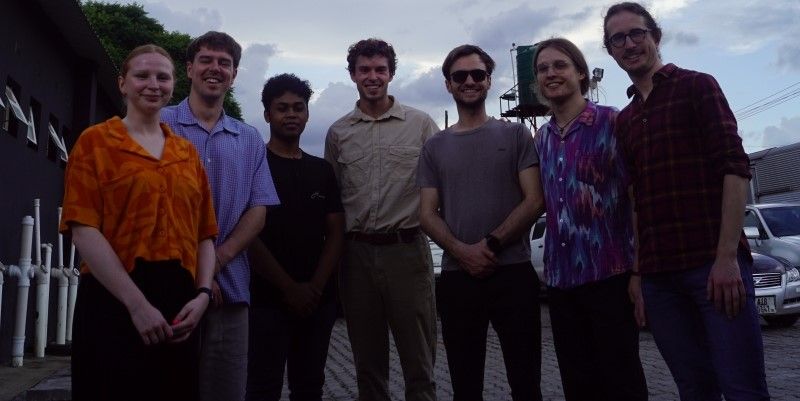Improving early warnings of thunderstorms

Meteorological experts and students are working together to improve early warnings of severe thunderstorms in Southern Africa.
Professor Doug Parker and Professor John Marsham are leading a ground-breaking weather forecasting ‘testbed’ as part of a project to create new early warning systems for vulnerable communities in Lusaka, Zambia.
A group of University of Leeds PhD researchers including Gregory Dritschel, Mendrika Rakotomanga and Joey Smith have been in Lusaka contributing to the project.
The PhD students have been training local forecasters from the Zambia Meteorological Department in testing and implementing impact-based nowcast weather forecasting using Leeds-based research.
It’s really important to understand what people need and this project has enabled us to speak to communities on the ground here in Lusaka. We now know that language is really key for communities to understand weather forecasting messages.
In return, the forecasters’ expertise in understanding African storms is helping the students guide and focus their research.
Southern Africa has seen two tropical cyclones in the last two months, with hundreds of thousands of people and livelihoods put at risk every year.
The Weather and Climate Information Services (WISER) Early Warnings for Southern Africa (EWSA) project is working with partners to identify solutions including local scientists, weather forecasters, and representatives from local communities.
The testbed project is a collaboration with the UK Met Office and the National Centre for Atmospheric Sciences alongside international and African partners.
Student impact
Joey, whose PhD topic is ‘Developing tools for early warning weather systems’, said: “My research includes nowcasting and to be out here in Zambia applying research to real-world problems is fantastic. It has been really beneficial to my studies to see the impact of implementing this testbed project.”
The ‘testbed’ is the first event of its kind in the region using real-time nowcasting – a detailed analysis and description of the evolution of storms over a period of up to six hours. Nowcasting can be more precise than traditional forecasting, which runs daily, weekly or seasonally.
One of the challenges with nowcasting is effectively disseminating the messages. With severe storms developing rapidly or changing their path without warning over the space of a couple of hours, messages and updates must be sent quickly. Therefore, diversifying the communication channels helps to ensure broader coverage and accessibility.
Professor Doug Parker, Professor of Meteorology and Principal Investigator for the WISER-EWSA project said: “We have learnt many technology and community engagement-related lessons during the project, even more so during the current king-size testbed.
“We hope to leverage these learnings throughout the imminent intensive testbed so that they eventually become part of the standard operating procedures for forecasters in the region.”
Ishaam Abader, Chief Executive Officer of the South African Weather Service, said: “The project collaborates extensively with the existing disaster risk reduction and community-based organisations, including people with disabilities, to respond to weather nowcast alerts promptly and ensure that nowcasts are easy to understand and reach the right people.”
University of Leeds PhD students in Zambia
Joey added: “It’s really important to understand what people need and this project has enabled us to speak to communities on the ground here in Lusaka. We now know that language is really key for communities to understand weather forecasting messages.
“I’ve learned how to take complicated technical work and turn it into actionable and accessible information for vulnerable communities.
“This project has given me the experience to take forward into a future project in South Africa later this year.”
Gregory, whose thesis is on ‘Convective Storms, Tropical Circulation and Climate Change’, said: “The project has inspired me to work on projects in the future which have practical involvement with people and interacting with different communities. It’s really important to have impactful work for people that need it.”
As part of his studies, Leeds PhD student Mendrika Rakotomanga, who originally hails from Madagascar and is supervised by Professor Parker, developed an effective storm-based machine learning approach for nowcasting thunderstorms at specific locations.
Supported by WISER-EWSA, Mendrika recently led an AI hackathon in Madagascar, where a group of young African scientists created innovative new weather prediction tools. Mendrika also took part in this testbed, where forecasters used his new statistical forecasting model.
Dr Katharine Vincent, WISER-EWSA user engagement work package lead from Kulima, a South African-based consultancy, said: “The EWSA partnership is both international and interdisciplinary, and has provided many opportunities for learning and exchange. This enriches the process of co-producing accessible weather information which helps to reduce risk in southern Africa.”
Further information
For more information, please contact Rebecca Hurrey at r.hurrey@leeds.ac.uk in the University of Leeds press office.
Picture Credit: WISER-EWSA.
For more information, please see the Met Office website page.





